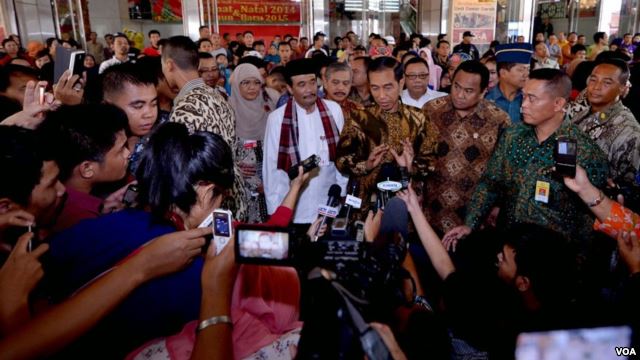VOA慢速英语:预计印尼将会是亚洲下一个万亿美元经济体
IHS Global Insight predicts that by 2023, Indonesia's GDP will double to two trillion dollars. It also thinks Indonesia's GDP will rise to three trillion dollars by 2028.
The company expects Indonesia will have a larger gross domestic product than Russia by 2021. It says Indonesia's expanding middle class will make the country the largest market for consumer goods in the Association of Southeast Asian Nations.
 |
IHS Global Insight chief economist Rajiv Biswas spoke with VOA's Victor Beattie about Indonesian President Joko Widodo, also known as Jokowi. Mr. Biswas noted how the president launched a major program to improve his country's power supplies, roads and other infrastructure.
"That has been very much part of his election platform, and in his early months of office, it's clear that he has a strong focus on that. And that is something that Indonesia very much needs. Indonesia is one of the Asian economies that is relatively underdeveloped in terms of infrastructure."
Rajiv Biswas says the spending on ports, roads and public services will help to fuel Indonesia's economic growth. The current growth rate is five percent a year. But it was about six and one-half percent a few years ago. Mr. Biswas says the government debt to GDP rate is low for Indonesia when compared to past rates. He says the former government did a very good job in reducing government debt levels.
Early in his administration, President Joko Widodo announced cuts in government fuel subsidies. For years the Indonesian government had used public spending to keep fuel prices low. The decision to cut subsidies was unpopular, but Rajiv Biswas says, it helped the economy.
"The fuel subsidy reform was very, very important because it was a heavy drain on their government expenditure in a rather unproductive form of just giving fuel subsidies to the entire population ... They will also be able to divert a lot of that money that would have been spending on fuel subsidies, towards infrastructure development, which is much more productive in the long-term for the economy."
Rajiv Biswas says automobile sales have jumped over the past five to seven years because of a rise in pay among Indonesia's middle class. He expects to see a pick-up in auto sales if the economy can grow at a rate of six to seven percent a year.
He adds that Indonesia still rates low on the World Bank's Ease of Doing Business Index. He says the country needs to increase manufacturing exports and create jobs.
IHS Global Insight reports that more than two million young people are joining the Indonesian labor force each year. It says continued job growth is necessary to avoid the risk of social unrest.
Yet the company estimates total per person GDP in Indonesia will rise from $3,400 this year to around $8,700 by 2025. It says this might give the Indonesian government a greater voice in international financial organizations and possibly the group of five nations known as BRICS. The five are Brazil, Russia, India, China and South Africa.
I'm Jim Tedder.
This report was based on a story from VOA's Victor Beattie. George Grow wrote it for Learning English. Hai Do was the editor.
______________________________________________________________
Words in this Story
weekend – n. the end of the week; usually Saturday or Sunday
domestic – adj. relating to or made in your own country
consumer – adj. relating to one's use of goods or products
infrastructure – n. required equipment or structures for an area (such as roads, bridges, power supplies and/or public services)
subsidies – n. financial assistance, usually paid by a government, to keep prices low
- 频道推荐
- |
- 全站推荐
- 推荐下载
- 网站推荐




















